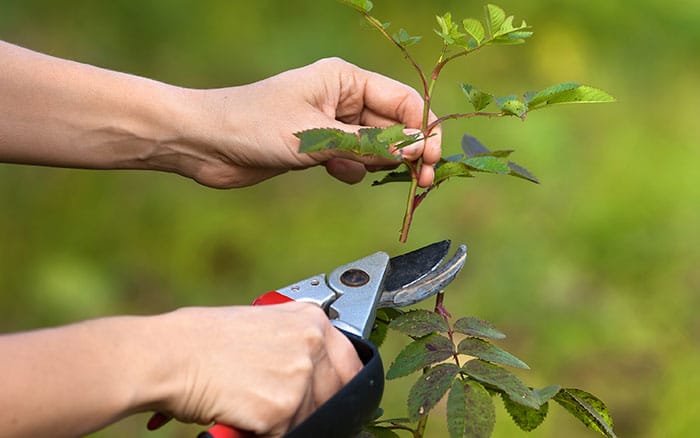Walking into a garden centre as a brand new gardener can be absolutely bewildering. The sheer range of tools and products on offer in incredible, and you could be forgiven for not knowing where to start or what’s important.
I wouldn’t want that putting you off the joyous and enriching life of gardening that is awaiting you, so I’ve put together a list of essential items that will start off your gardening journey on the right foot. There are many great tools beyond these that will make garden tasks easier and more enjoyable, but with these basics in your toolkit you will be ready to get stuck in.
Secateurs / Pruning Shears
These beauties should always be on your belt. They are the crafters and shapers of your garden, and the key to keeping your plants looking beautiful. Not just about the aesthetic though, you will also help plants by trimming away dead areas to make room for new growth.

Tip: Pruning and cutting back helps give a good display or crop.

Trowel
The trowel is one of the most basic and well-used tools in your arsenal.
When you need to get down in your borders to plant new additions or move things about, the trowel is your right hand man. It’s also an important tool for weeding.
Tip: Remove weeds just before they seed – bees love the flowers.

Spade
Your trowel will take care of a lot of jobs, but sometimes you need to bring in the big guns. A good spade with a D-handle and a curved tip is an indispensable part of your armoury.
Make sure you get one that you can have sharpened occasionally, as it will save you a lot of elbow grease on the big jobs.
Tip: If clay sticks to your spade, spray with WD40 before using.
Gloves
Your hands will take a real beating if you’re not careful. And rooting around in soil with scratched fingers can also open you up to infections. A good pair of gloves, something not too bulky but with good protection, will keep your hands in good nick whether you’re ripping up brambles, carrying logs, or doing some blistering digging.

Tip: Gloves help prevent contact with soil-borne and bacterial infections.

Fork
Trying to loosen and aerate soil without a good fork is a fool’s errand. It also can’t be matched for digging up plants under certain conditions and getting under roots, and is very important in harvesting some root vegetables.
No shed is complete without a solid fork.
Tip: Forks help reduce damaging crops when lifting out the ground like potatoes.
Kneeler
Young or old, your knees may have a hard time dealing with the hard ground when you’re gardening.
Get a kneeler you can carry with you, especially if you know you’re going to be stuck into your borders for a while.

Tip: Don’t just use for your knee – use to sit on when enjoying a picnic!

Hose
A good hose with adjustable heads may be one of your most used garden tools. For some people, it’s the only tool they use every day. Watering cans are great for certain tasks, but you don’t want to be up and down your garden a hundred times a day with a heavy can during a dry spell.
Tip: Ideally water early morning.
Fan Rake
If there are any deciduous trees nearby, then come autumn you will be requiring a rake. There’s no better way to clear leaves and debris from your lawn and borders.
A rake is essentially a broom for outside use, and, of the many versions available, the springbok (fan) rake is the most popular.

Tip: A springbok rake is the best way to clear moss from your lawn after winter.
As a final note, the adage ‘buy cheap and buy twice’ is just as true here as elsewhere. Good quality tools can literally last you a lifetime if they are well cared for. So, where you can, buy good, sturdy tools. Also invest in a bottle of linseed oil; a little wipe over your metal implements will protect them from rust and erosion, adding years of life to your instruments.

Fab for the allotment